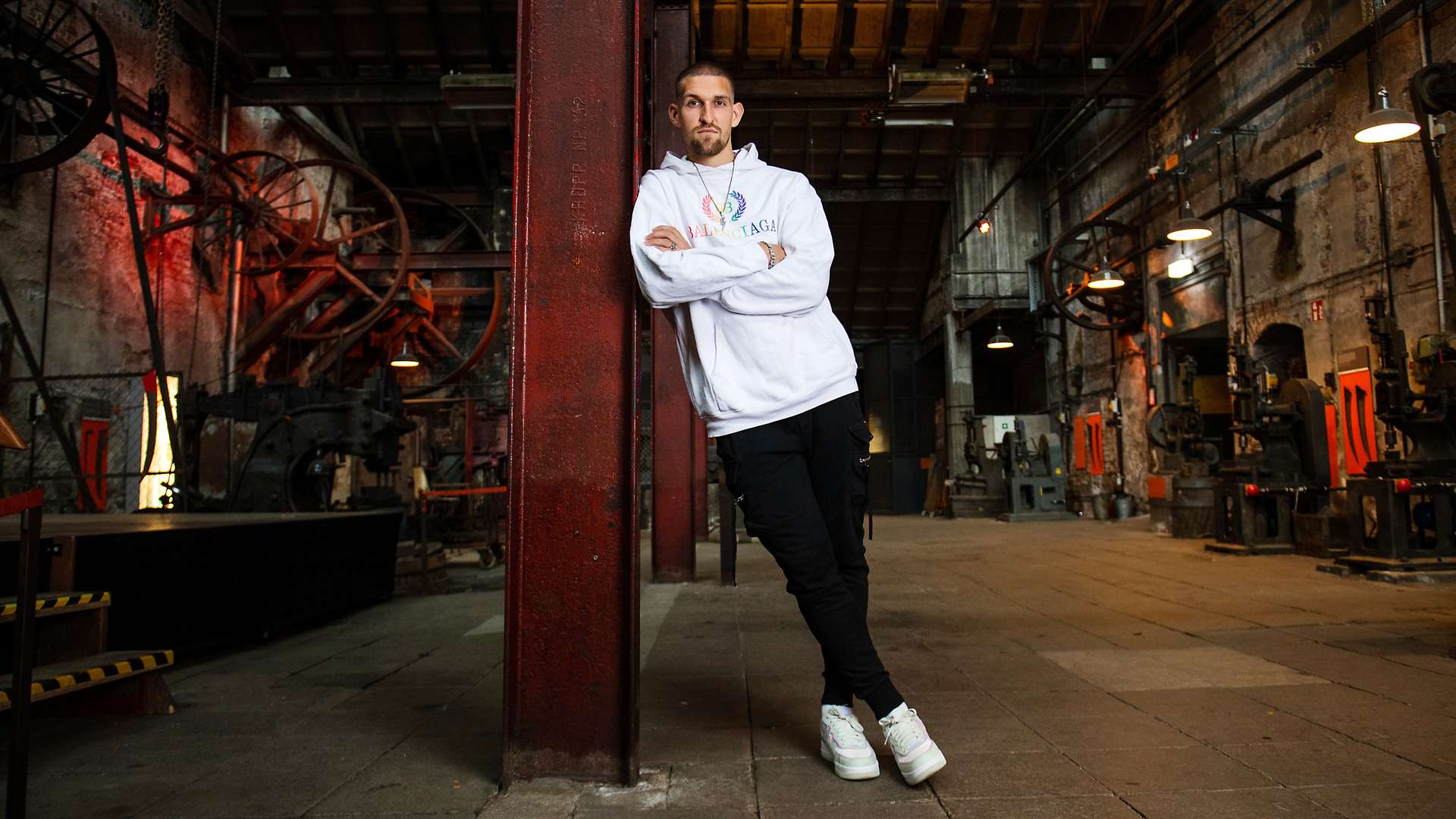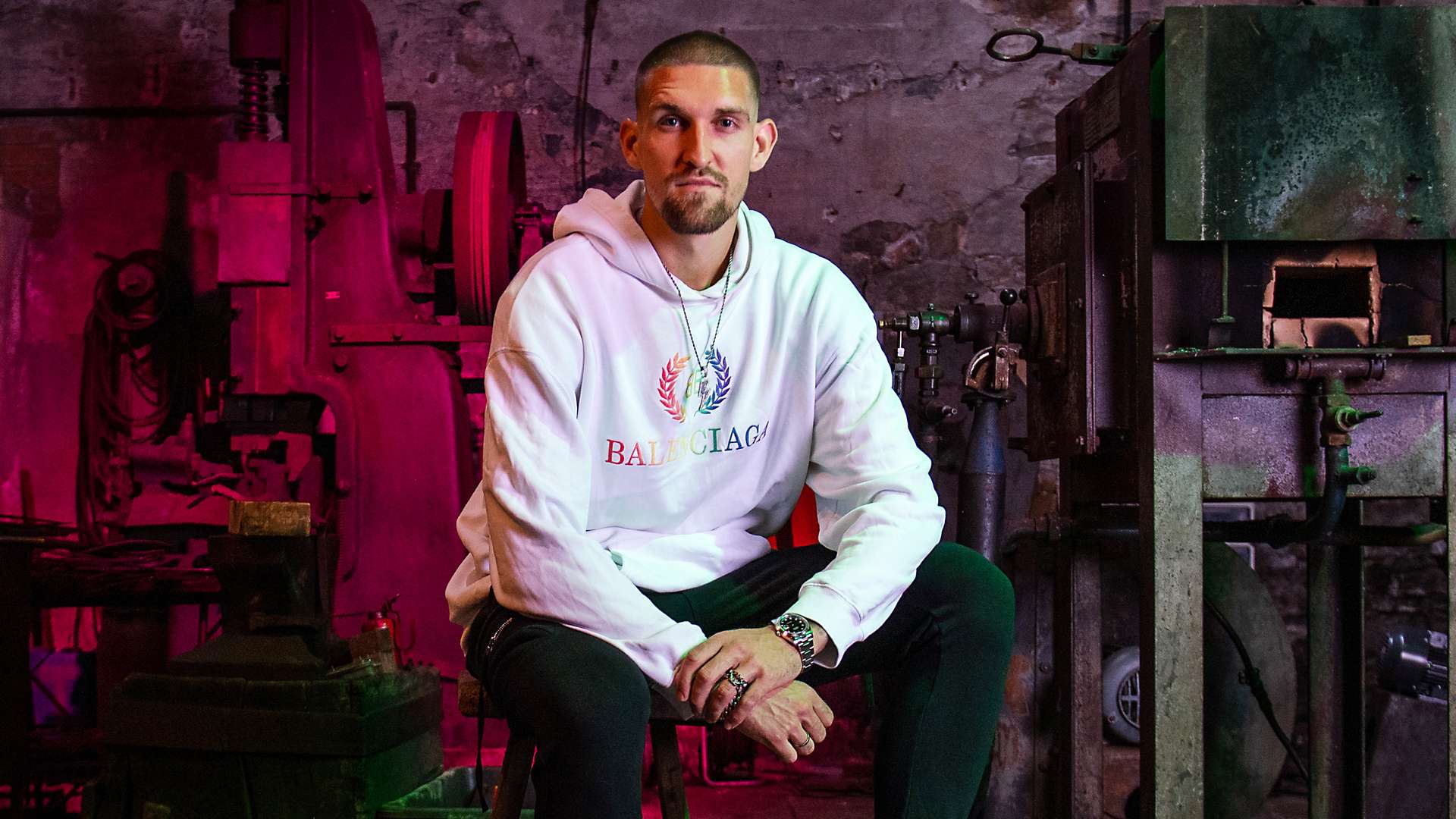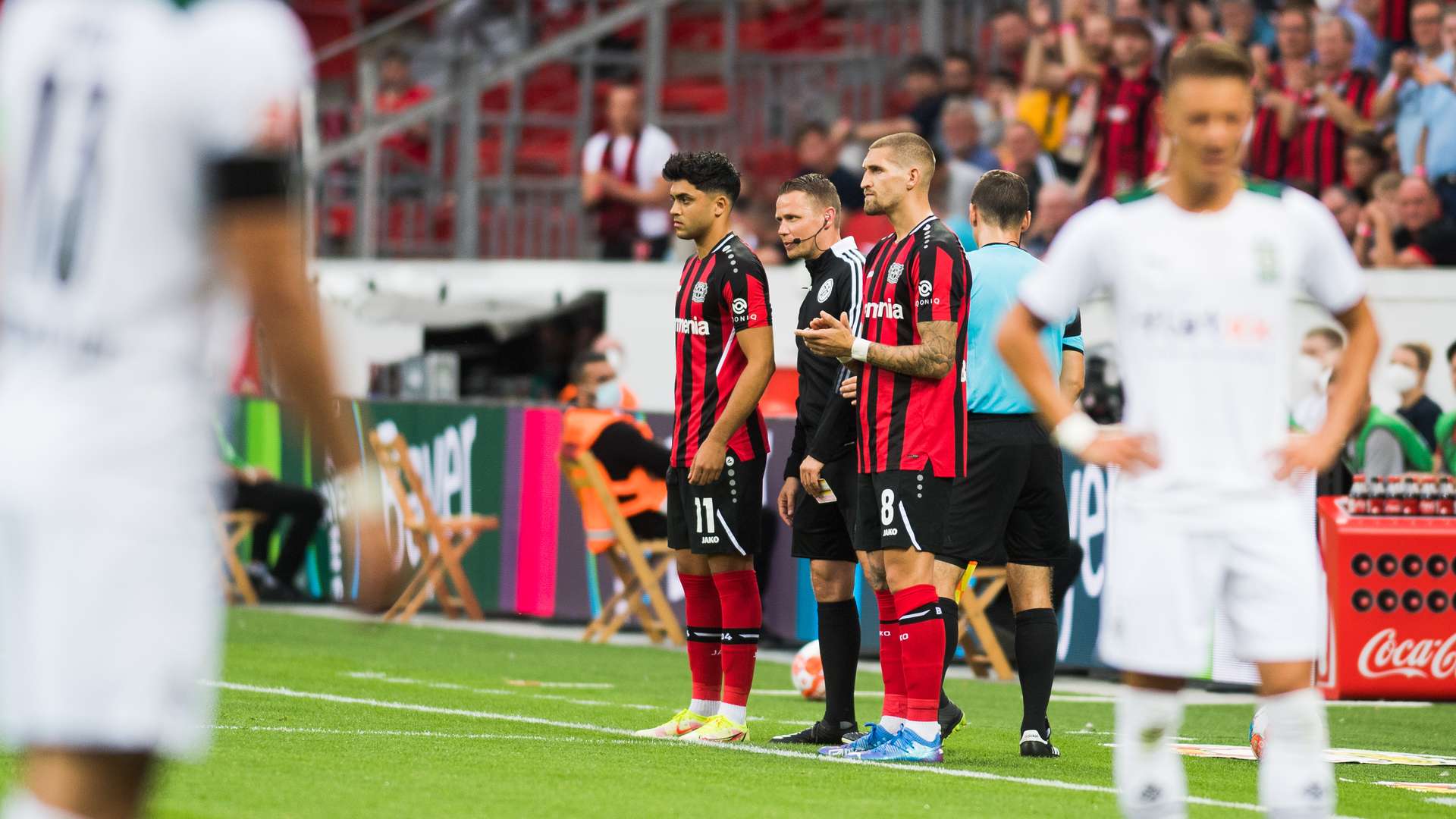'I've never had any doubts'
Robert Andrich interview

Robert Andrich is a special player with a special career path. In an extensive interview, that appeared in the Werkself Magazine number 33 in October 2021, the 27-year-old midfielder talks about the lessons from the first years of his career, tips for young teammates as well as the defining relationship with his father.
Robert, you made your way up from the Regional League to the Bundesliga step-by-step and you landed up at Leverkusen last summer after two intense years at Union Berlin. What are your impressions of Bayer 04 so far?
Andrich: The most striking thing is the high level. I've never played in such a strong team before. But also very striking for me is how many people work here. One example: After the first training session, everybody put their boots on the table. When I asked them what they were doing they told me that they would be collected and cleaned. I was a bit confused because up to then I only knew that I had to clean my own boots. You can see it's at another level. Everything is done here for the team to focus on the important things. But I feel the same love as at Union, it's equally relaxed and everybody gets on well with each other.
You are a fascinating bloke and, on the one hand, you combine special romanticism of football because you've worked your way up from the lower leagues and still dream of sporting targets – and, on the other hand, you've long been established in the Bundesliga. What do you think about that?
Andrich: My career trajectory is definitely rather special for these times. When I look at most of my new teammates they came to Bayer 04 when they were 18, 19, 20 from their hometown clubs or came through the ranks here – and I took a different path. Therefore, I know how to value the conditions at the club and my own status more. But, of course, I would have been happy if I could have played in the Bundesliga when I was 18. But I think the roundabout way I had to go has made me the person I am today. It took a bit longer to get to know how to behave and how I'd like to be seen. But now I'm very happy with everything – exactly as it is.
Can you specify the things you value even more?
Andrich: I can imagine a lot of young players are more relaxed about the start of their careers than I was back then. You've got talent, are young and already in the first team – you think it would just carry on like that. I didn't take a lot of things seriously such as the issue of sleep. I would regularly be out partying during the week. And I didn't want to listen to warnings from other people such as my parents. But fortunately I later understood that certain things are essential to be successful and to be able to show your quality.

Did where you were living play a role back then?
Andrich: The environment obviously has a great influence. When I played for the Hertha reserves, I lived in a three-person flatshare in Berlin. With two players from the team: an older leading player and another 18-year-old. In addition: We didn't have much to play for as the Regional League was not good at that time. We were mostly much better than the opposition but the club didn't want to get promoted – and it was impossible to get relegated with that group of players. Therefore everything was so relaxed. So, I used to go out for a bit on Wednesday, which sometimes ended at six in the morning. Then you had two hours sleep before training, mooched around all day and then slipped into a lifestyle where you felt good, were out and about at night and then you lose the plot. But you mustn't get into that rut, which is very difficult in Berlin. You have to have a very strong character and know what you want early on. And: You have to invest a lot to achieve what you set out to do. That lifestyle is not enough to play in the top two divisions in the Bundesliga.
When did you realise that?
Andrich: Well, I had a good time at Dresden after moving on from the Hertha second team – but the party phase wasn't over yet. Things didn't go well for me on the pitch at Dynamo. But people adore you if you're a Dresden player. I joined a club where it felt like everybody got a message on their mobiles: Player XY is here now. Everybody looks at you and it obviously feels cool from the first moment at that age. But it was a catastrophe for me on the pitch. I was almost exclusively in the stands. And when the whole city celebrated promotion to the second division I felt like a spare part. I didn't contribute anything. And slowly the realisation came through that the coach isn't always responsible for everything and that perhaps I needed to do certain things differently.
Did you still believe you had a career in the Bundesliga back then?
Andrich: Yes, I always had a highly developed level of confidence. That often used to turn into arrogance as I got it into my head that I was a player who always said what he thought, was forthright and didn't take any nonsense from anybody. That resulted in me mostly having a different opinion and wanting to stick my oar in. And that went more and more wrong in the long run. Then I listened to my inner voice and set out to accept things more readily. But inwardly I never had any doubts about a professional career because I always knew I was actually a good player and only had to change a couple of things to achieve my target.
What was the turning point?
Andrich: The most important step in my career was the move to Wehen Wiesbaden. I looked for a club in the third division who had the ambition to go up. And the team that played proactive football that suited my style. I got to know my wife there and I developed a huge amount – and from that point everything was really on the up. (He laughs)
Do you now pass on that experience to young players?
Andrich: On the one hand, I want to show on the pitch from day to day that quality comes from hard work. Now at the age of 27, I also say to the young players what they should and shouldn't do. I never listened to that advice back in the day and always just said: 'Don't worry yourself, I'll get it sorted'. But you can't do it so easily at this level and you have to get things right early on.
These days, young players are developed much more intensively and earlier than at your time. Do you think that in spite of your experience that development can go too far in academies?
Andrich: It does bother me a bit that everybody now has the same input very early on. I think concepts like counter pressing are uncalled for with the U10s. You should be having fun at that age and just play without thinking too much about tactics. Or the fact that no real blokes make it through to the Bundesliga any more. That also comes from being told early what you should say and what you shouldn't. That's a great pity and I'm glad I can still get my opinions heard and everything isn't set out for me.
Do people have to adjust to your direct approach?
Andrich: I'm always up for things and it's easy for me to talk to people who I don't know. But sometimes I have the problem that you feel relatively quickly if I perhaps don't like somebody straightaway. I still need to work on that with my facial expressions and gestures. But that's never meant to be mean. I've made the experience with many people that they are totally aloof when success comes. According to the motto: Who are you then? What do you want from me? I don't want to be like that. I definitely don't want to appear arrogant or dismissive.
Immediately after you were signed, people said Bayer 04 and brought in a real mentality player in Robert Andrich. Does that description fit you?
Andrich: Yes, I think that fits in really well. But I think mentality player isn't just somebody get stuck in and fouls. Mentality also means how I handle my teammates, how I try to really help a younger player doesn't come from Germany and has a language barrier. And you have to do that. I'm 27 and I've had lots of experience although I've 'only' played in the Bundesliga for two years. I know very well how German professional football works and what it's about here. And that's why I try to carry teammates along and help them.
Your father Lutz was also a player and has been an important source of advice up to now. Does he sometimes say after a game: "Lad, that was no good"?
Andrich: (He laughs) The feedback has become more positive over the years. When we used to drive home after a game in my youth we spent ten minutes talking about my performance and then there was half an hour of silence as I was so annoyed because his criticism was relatively tough. But that's improved over the years. That's also to do with the fact that I'm now grown-up and we only talk about performances and the Bundesliga top level. He's really good at working out if I need to play differently in certain situations than he’s used to from me. And then he can take one or the other criticisms from time to time. We are very, very honest with each other and he's proud of me.
Was he also your role model or couldn't he be that because his criticism was so tough?
Andrich: You have to get that right. He never rubbished me. But tough criticism was standard as my father demanded a lot from me very early and he didn't want me to waste my talent. In my youth, in addition to normal training there were special shifts with him that included really banal things like juggling with strict changes: only left, then only right. And then he said: We won't be going home until you do a certain number. The older I was, the more he tried to pass on things to develop my personality. Therefore, he was very worried at the time with the rowdy night life…
…did he know about it?
Andrich: Of course – my parents aren't daft. When they watched me play at the weekends it was clear to them: 'The lad’s had another tough week again.' My father was worried that I'd make a mess of everything. Both of them are now even more proud that I've made it into the Bundesliga and to a big club like Bayer 04.
Changing clubs is all part of professional football. Nevertheless, you can't always prepare for that in advance – also not mentally. Is there something about professional football that annoys you?
Andrich: My wife would now definitely say: the moves. She was in the late stages of pregnancy during our move from Berlin to the Rhineland. On top of that: We've been together five years and it's already the fourth move. We even moved once in Berlin. (He laughs) Therefore, she's really happy that we’re now living in one place for the time being. In addition: my wife is responsible for putting up cupboards – and I'm in charge of cooking. That's not perhaps the traditional division of roles but it suits us really well.

How do you like your new stage, the BayArena and what are your sporting targets with Bayer 04?
Andrich: It's a great stadium with its own atmosphere and I like it very much. And with the first home games of the season against Dortmund in Gladbach, where I was on the pitch, there was a fantastic atmosphere. Therefore, it is also my biggest wish to experience that special atmosphere at home and away, first in the Europa League and then next year in the Champions League. That would be brilliant for me. But I also believe: If you think too much about it and get lost in dreams then you can you lose your way. That's why I've done well in past years with enjoying the moment and making the best of it. But, of course, the target of playing in the Champions League is now closer at Leverkusen. Let's see what happens.
HERE is the online version of the Werkself Magazine number 33.
